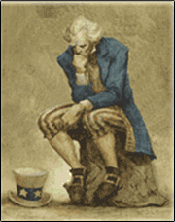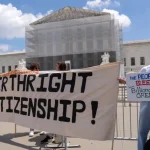
–>
February 12, 2023
In a recent article about the moral decline of the U.S., Michael Bresciani noted that a recent Gallup survey indicated that the respondents selected poor leadership, inflation, and immigration as the most important problems facing our country.
‘); googletag.cmd.push(function () { googletag.display(‘div-gpt-ad-1609268089992-0’); }); }
Sadly, he also noted that at the bottom of the list in terms of significance (ninth place) was ethics, morality, and family decline.
Based on Bible priorities, he rightly says, “we can safely conclude that Americans have it backwards, or upside down.”
The decline of the item at the bottom of the Gallup list is the real reason why we are in decline as a country. In writing this, Bresciani echoes and updates the conclusion of the great Puritan minister of the 17th century, John Owen.
‘); googletag.cmd.push(function () { googletag.display(‘div-gpt-ad-1609270365559-0’); }); }
Owen wrote:
“This hardening [moral decline] is so serious that your heart becomes insensitive to moral influence…. You who at one time were very tender and would melt under the influence of the Word and under trials will grow ‘sermon-proof’ and ‘trial-proof.’ You who used to have great assurance of God’s love, trembling at His presence, the thought of death, and your appearance before Him, will now have a hardness in your heart that remains unmoved by these things.”
We should lament that, too, because of how far our country has come from its Christian spiritual foundations in Protestant Christianity, and particularly, the Puritan mind.
We know that the Puritans came to New England with the intention of founding a blessed Biblical “city on a hill.” Governance was according to Biblical principles with elected magistrates in Massachusetts, Rhode Island, and Connecticut. By 1641, Connecticut passed its first “Code of Liberties” which was a legal code modeled after the Old Testament laws, albeit not exactly the same.
Biblical morality was the centerpiece of the culture.
In Virginia, where the earliest settlers belonged to the Church of England and not to the Puritans, the church as well as the fort were the first two structures built, and attendance at church was required on a daily basis.
‘); googletag.cmd.push(function () { googletag.display(‘div-gpt-ad-1609268078422-0’); }); } if (publir_show_ads) { document.write(“
Within less than two centuries, the ideals of settlement as part of the eternal struggle against Satan, sin, and the world gradually became diluted.
Under the influence of the English physician and philosopher, John Locke, the oppressions of the British monarchy were deemed unbearable as well as unjust and un-Christian. However, John Locke’s defense of Christianity in his little read Reasonableness of Christianity was considered by many colonial Christians as insufficient for its lack of reference to holiness, Bible miracles, the divinity of Christ, and the authority of Divine Providence in everyday affairs.
The heavy taxation the colonists endured, the requirement that they house and feed British troops, the replacement of the Puritan leadership in Massachusetts with a monarchic (Church of England/non-Puritan) governor (Andros), and twenty-plus grievances listed in the Declaration of Independence were deemed unbearable oppressions. These grievances were compounded by the fact that the colonies were populated with non-Church of England Christians (e.g., Quakers, Puritans, Baptists) who considered that the non-religious oppressions were motivated by a desire to persecute the colonies’ non-Church of England inhabitants.
Thus, in this writer’s opinion, the War for Independence, while it was justified in part as a blow against colonial oppression, tended to put the emphasis on the connection between political freedom and practical anti-monarchical ideas and to diminish the deep commitment to Christian morality as the focus for day-to-day living. Of course, many ministers preached in support of the Revolution, but that meant that politics entered the pulpit increasingly as tensions between the Crown and the colonies increased. The U.S. became a type of living political experiment and a tension between political and economic goals and spiritual goals became a built-in tension in American society.
In the 19th and 20th centuries, the Christian foundations of our higher education institutions like Harvard, Yale, and Princeton became increasingly diluted.
Harvard’s leading philosopher in the 19th century, Ralph Waldo Emerson, is symbolic of this dilution. He left his role as a Unitarian minister after his wife died and advanced a philosophy that incorporated romantic ideals about nature, the transcendentalism of Immanuel Kant, laying the foundation for the later work in theosophy of Madam Blavatsky.
He in turn passed the baton of enlightened intellectuality to Walt Whitman, the great poet, and wrote to him, “I salute you at the beginning of a glorious career.” Whitman’s poetry did not send a Christian message.
Also, in the 19th century, communes such as the Oneida Community, were begun where multiple sexual partners were the norm in an effort to establish a distinct and less selfish lifestyle than that lifestyle which Karl Marx would designate as “bourgeois.” After the publication in Europe of Das Kapital in 1859 and the Communist Manifesto written with F. Engels in 1848, the ideas of individualism and of the nuclear family began to gradually weaken.
By the time this writer was a graduate student at Harvard for six years, the word “God” was not mentioned in my presence even once (let alone Christ).
In the Protestant understanding, the individual was saved and called to a higher morality by a living faith in the one and only God. He or she was and is saved as an individual and is called to live under the power of God according to a Biblically inspired and God-determined morality.
Cultures and societies as such are not “saved,” but only individuals who then may or may not wish to marry to have families and the family becomes the building block of society. The families within a community build that community. It is not a “global village” that comes first in importance before the family as in tribal societies. It is not the General Will that controls our destiny as proposed in Jean-Jacques Rousseau’s mystical fantasies. And it is not the overthrow of the bourgeois values of family life and the creation of a “dictatorship of the proletariat” nor a final victory of the communist vision — the withering away of the state — that sets the true standard. Rather, it is the individual living a life committed to Biblical values who then establishes a nuclear family with someone of the opposite sex who then in concert with others builds community. That is the etiology of the Christian world and Christian societies. Deviations from that model are perverse.
It is obvious that the U.S. has drifted very far from the individual spiritual and family ideals of our founding. That drift did not happen overnight; it has been going on for centuries, but has accelerated since the 1990s. Society has not recovered from the image of a lascivious President soiling an intern’s dress.
Image: Picryl / public domain
<!– if(page_width_onload <= 479) { document.write("
“); googletag.cmd.push(function() { googletag.display(‘div-gpt-ad-1345489840937-4’); }); } –> If you experience technical problems, please write to [email protected]
FOLLOW US ON
<!–
–>
<!– _qoptions={ qacct:”p-9bKF-NgTuSFM6″ }; ![]() –> <!—-> <!– var addthis_share = { email_template: “new_template” } –>
–> <!—-> <!– var addthis_share = { email_template: “new_template” } –>






